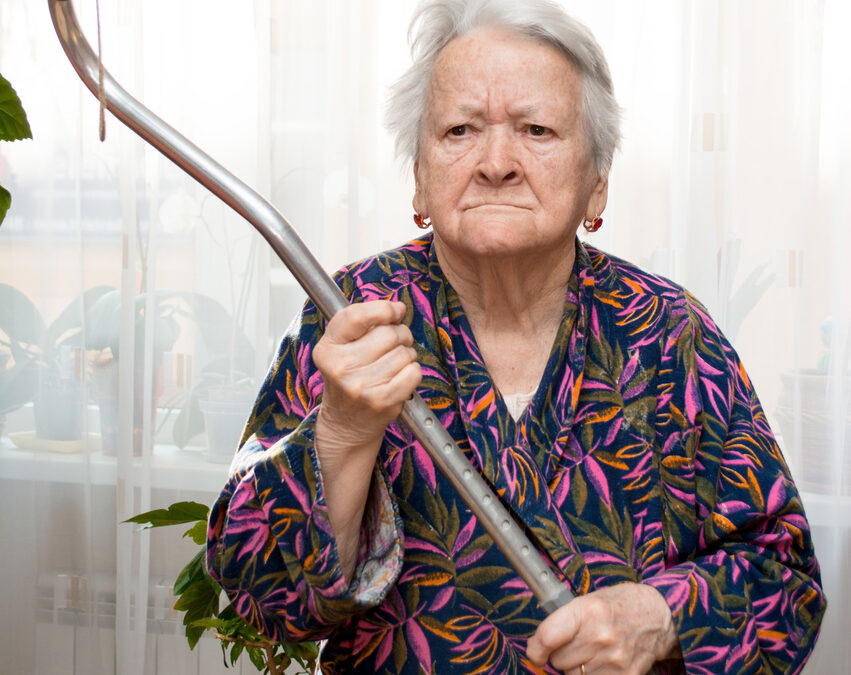Contents
Understanding Anger in Elderly Loved Ones
Your senior parent always seems angry but you don’t know why. Anger in elderly loved ones is quite common. Yet we often struggle to find what causes anger in elderly in our care. Whether the outbursts are verbal, physical, or simply quietly shown, we need to find help for managing this anger in the elderly.
Are you upset because your elderly loved ones getting angry day by day? Stop worrying because this is a natural process that may be a symptom of stress or a masking emotion used to suppress emotions that make an already insecure older person feel depressed. Still, it’s also a natural part of the aging process. So, don’t worry about anger in the elderly ones.
Regardless of its source, anger can be extremely harmful to the caregiving process. Moreover, affecting the elder and their caregiver and loved ones and the relationship between them. It’s not always easy to be tender and understand someone prone to anger outbursts over seemingly insignificant things.
Remember that your elderly loved one is going through significant life transitions, many of which are unpleasant. Keep calm and never hit or scream at a senior who shows frustration or rage. Helping your seniors find something they can put their time and energy into can make them feel less irritable. Moreover, it can also help them rediscover or develop a new self-definition!
Identify the Warning Signs
The first step in dealing with anger in the elderly is to figure out how the elderly are feeling and what has caused them. Seniors may turn on their in-home caregivers because they are upset. However, it is due to chronic pain, aging, memory problems, the loss of loved ones, or their inability to care for their own needs.
They may be acting combatively as a reaction to something disturbing or unpleasant in their atmosphere, or they may be hungry or thirsty and unsure how to express themselves at the time. As a caregiving person, you should identify the sign and symptoms of anger in elderly ones.
Moreover, below we have mentioned the causes of anger in elderly loved ones and tips to get rid of anger.

What are the causes of anger in elderly loved ones?
Although there are many reasons behind the anger in the elderly, and it also depends on individuals. But we have summarized the overall general causes of anger in older adults. Let’s have a look.
Depression
Anger may be a sign of depression, described as a period of sadness and lack of interest that lasts at least two weeks. Anger may be silenced or displayed openly. The strength of offense and how it is expresses differs from one individual to the next.
You elderly other signs if you have depression. There are some of them:
- An irritable disposition
- Energy loss
- Thoughts of sadness
Obsessive-compulsive disorder
Another cause of anger in elderly loved ones is obsessive-compulsive disorder. OCD is a form of anxiety disorder cause obsessive thoughts and compulsive behaviors. Unwanted, intrusive thoughts, impulses, or images drive a person with OCD to do something over and over again.
They might, for example, follow certain behaviors, such as counting a specific number or repeating a word or phrase moreover, because they have an unreasonable fear that if they don’t, something terrible will happen. Anger is a common sign of OCD, according to research. It affects roughly half of people over the age of 60.
Anger may arise due to dissatisfaction with your elderly inability to control obsessive thoughts and compulsive behaviors. However, it may result from someone or something interfering with their ability to perform a ritual.
Dementia and anger
This factor is vital to know how to handle loved ones who are usually gentle and caring but unexpectedly start cursing or saying offensive things. If this behavior is unusual, it may be a sign that dementia is setting in. Alzheimer’s disease may appear to be a disease that only affects memory. But it may also contain severe neurological and psychological symptoms.
Dementia or Alzheimer’s disease patients perceive a different reality and have difficulty regulating their emotions, responses, or behaviors. They can feel irritated or frightened and unable to recognize or express their feelings. So, one of the primary causes of anger and rage feeling in elderly one is dementia.
Loneliness
Another major cause of anger in elderly loved ones is loneliness and isolation. For a variety of reasons, seniors experience social alienation and loneliness. Friends and family may become less available as they grow older. Similarly, driving difficulties will make it challenging to keep up with social obligations.
The crucial thing to remember is that social isolation and loneliness can have various negative health consequences for the elderly. Loneliness can exacerbate depression and chronic disease, as well as contribute to cognitive deterioration over time.
Noisy Environment
Aggressive dementia activity may also trigger by a loud or busy environment. When your senior begins to act violently, take note of the surroundings to see if you can quickly settle the situation. Reduce the music volume, turn off the television, and ask others to leave the room.
Certain Medications
Anger symptoms can have a side effect of certain widely prescribed medications. If your elderly loved ones are taking several drugs, they are particularly vulnerable. At the same time, everyone may be affected by the mood-related side effects of prescription medication.
Moreover, older adults are more susceptible because their bodies become less effective at metabolizing and absorbing medicines as they age. Speak to the doctor if they become upset after beginning a new drug. You may be able to reduce their dosage or turn to a drug that has little effect on your elderly loved one’s mood.
Ways to prevent anger in the elderly loved ones
Below are some ways to reduce the feelings of anger in your elderly loved ones.
Quality sleep
Many older people suffer from sleep issues, especially insomnia. Sleep deprivation, on the other hand, triggers anger. Your elderly should aim for a total of 8 to 9 hours of sleep every night. Avoiding alcohol and caffeine, maintaining a regular sleep-wake schedule, making sure their bedrooms are quiet and calm will help them get better sleep.
Exercise
Exercise is an effective antidepressant. Studies have shown that it is just as effective as antidepressants. And you elderly don’t have to put in a lot of effort to enjoy the benefits. Try going for a quick walk right now with your elderly to see how much better they feel. Any activity that gets them up and going is beneficial to control their anger.
Look for small ways to increase their daily movements like light housework or gardening. And if they are sick, more aged, or disabled, you can do many healthy exercises from a chair or wheelchair to increase their strength and improve their mood. Pay attention to the elderly one’s body and ease up if they are in discomfort.
Always use a gentle tone.
Take a full breath and attempt to remain as calm as possible when your older parent becomes agitated. If you’re mad, you’re unconsciously worsening the situation. Your elderly frustration and agitation can overcome by remaining calm and breathing slowly. Slowly speak and maintain a soft, reassuring, and upbeat tone. If possible, to provide warmth and reassurance, use a gentle and soothing touch on the arm or shoulder.
Always give respect
Everyone deserves to treat with dignity, regardless of their age or skills. Moreover, your elderly loved ones with dementia are no exception. There are several ways to make it simpler for them while also showing consideration, even if they struggle with decisions or daily tasks.
Offering simple options, such as the red or blue shirt described earlier, is an excellent way to do this. You won’t be issuing commands and asking them to obey. You’re assisting your seniors in making choices that are appropriate for their current life. In this way, they will feel more relaxed, and it automatically reduces their anger.
Please give them the purpose of living.
It’s essential to stay committed and have a good sense of intent in life to conquer anger and prevent it from returning. Life changes as we age, and you may forget things that previously consumed your time and provided meaning to your life, so, as a caregiver, always try to give your elderly loved ones a new purpose for living.
As a caregiver, you may know the interests of your elderly ones. So, try to engage them in something that might interest them and keep them happy.
Traveling
Travelling is one of the best ways to reduce stress and manage anger symptoms in elderly loved ones. Plan a holiday to a different location or a weekend trip to a favorite site. Travel does not have to be costly or lavish to improve their mood. Please encourage them to explore the beautiful walk or ride, go hunting or camping, or spend the day at the beach and spend time in nature.
Conclusion
Caring for someone having depressed and anger symptoms are complicated, particularly when they lash out at you. It’s perfectly normal to feel overwhelmed, lonely, or depressed. But if you are a caregiver, try to remain calm and find out the reasons behind the anger in elderly loved ones. Moreover, adopt some measures to ease them out and help them to take out of this situation.
Read More
Managing Sleep Problems in Elderly





